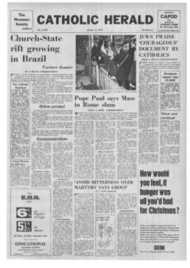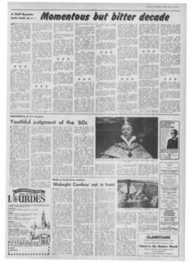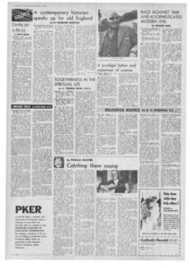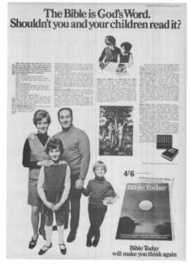Page 3, 2nd January 1970
Page 3

Report an error
Noticed an error on this page?If you've noticed an error in this article please click here to report it.
Tags
Share
Related articles
Washington Visit To The Kennedys
Taking A Shine To The Catholics
Pitfalls On The Path To The White House
Catholics In Running For President
Another Fine Hour For The Democratic Party
A Staff 'Reporter looks back on a —
Momentous but bitter decade
DURING the first week of aLsr 1960 a Catholic senator, John Kennedy announced he was seeking the Democratic party nomination for the US Presidency. 1960 also saw the creation of the first African Cardinal, Bishop Laurian Rugambwa of Rutabo, Tanganyika.
The first definite trickle in the thaw between Rome and Canterbury came in December when Dr. Geoffrey Fisher became the first post-Reformation Archbishop of Canterbury to visit the Pope.
In July 1961 Pope John commemorated the 70th anniversary of Leo XIII's social encyclical Berton Novarum by issuing an updating document Mater et Magistra.
Cardinal Augustine Bea, President of the Christian Unity Secretariat, forecast that the forthcoming Vatican Council announced by Pope John in 1959, would be prepared to take into account the historic causes of Christian disunity. The Council, with some 2,000 bishops, opened in October 1962. We soon learned to use such novel theological labels as "progressive, con servative and moderate."
By December the first stormy session of the Council had ended and, among other things, had given broad approval to the Mass in the vernacular.
January 1963 saw the death of Cardinal William Godfrey, Archbishop of Westminster. aged 74.
The Pope issued his eney
clical Paccm in Terris, pleading for peace through the respect for the rights of others and the christianising of the social order.
In June Pope John died mourned by millions outside the Church as well as in. Even the leader of the Communist world, Mr. Krushchev paid tribute.
Cardinal Giovanni Battista Montini, Archbishop of Milan, was elected Pope after a short conclave, taking the name Paul VI The Archbishop of Liverpool, Dr. John Carmel Heenan, became leader of English and Welsh Catholics when he became Archbishop of Westininstei .
The Pope decided laymen could attend the Council. The theme of the second session was the "Church in the Modern World" with increasing emphasis on catechetics, scripture studies, mass media and ecumenism.
British Catholics learned that they were soon to have a common version of the Scriptures with their separated brethren in form of the Revised Standard Version.
In November the world was liorrified when John FitzGerald Kennedy the youngest and first Catholic President of the U.S., was assassinated.
Pope Paul broke the "prisoner of the Vatican" tradition of reigning pontiffs by announcing he was to visit the Holy Land. Archbishop ITyginus Cardinale became the new Apostolic Delegate to Britain.
In May the English and
Welsh hierarchies followed the Dutch bishops in rejecting the pill as a means of birth limitation. Contraception, they averred, was not an open question.
The P_ announced he was setting up a Secretariat for Non-Ch ri stlans.
In June English and Welsh Catholics learned that the vernacular would be introduced into the Mass the following November. The Pope said that women could attend the Council. Archbishop Heenan pleaded strongly at the Council for the exoneration of the Jews from the charge of deicide.
In the Council a call for the re-examination of the traditional teaching on birth control came from Patriarch Maximos Saigh IV and Cardinals Alfrink, Suenens and Leger.
In December the Pope attended the Eucharistic Congress in Bombay and in Britain the rigidity of the rules against Catholics attending non-Catholic services was relaxed. Archbishop Heenan received the red hat in January 1965.
Fr. Pedro Arrupe, S.J., a Spanish born Basque, was elected General of the Jesuits. The Sword of the Spirit changed its name to the Catholic Institute for International Relations and announced its own Voluntary Overseas Peace Corps scheme.
Pope Paul made a visit to the United Nations in New York to plead for peace. The Council began probing the question of religious liberty. Stormy petrel Archbishop Roberts made an unsuccessful attempt to intervene in the Council to plead for an unequivocal statement concerning the rights of conscience.
The Pope removed celibacy from the terms of reference of the Council. In November he announced the cause for the oanonisation of Pope John and Pope Pius XII.
In January 1966 the highlight of the unity octave celebrations came when Fr. Thomas Corbishley, Si.,. became the first Catholic priest since the Reformation to preach in Westminster Abbey. Extremist Protestants, including Dr. Ian Paisley, demonstrated inside and outside the abbey.
In March Archbishop Ramsey of Canterbury visited the Pope just after he had lifted the decree of excommication on Catholics contracting marriages outside the Church,
Cardinal Alfredo Ottaviani warned bishops and heads of religious Orders against "abuses of interpretation of Council decisions" and "staggering and audacious opinions." A joint Anglican and Catholic Preparatory commission to debate mixed marriages and Anglican orders was set up.
The sensation of the year for British Catholics came in December when Fr. Charles Davis, who had done so much to popularise the new insights of the Second Vatican Council, renounced his priesthood, left the Church and later married. He said that inside the Church there was concern for authority at the expense of truth.
1967 opened with the departure of the doyen of British Catholic journalists, Douglas Woodruff, who had edited the Tablet with such distinction since 1936. The departure of another journalist, Dominican Fr. Herbert McCabe, sacked as editor of New Blackfriars after he said that
the Church was corrupt, created a storm of controversy.
The U.S. National Catholic Reporter leaked the majority report of the Papal Birth Control Commission recommending that married couples be allowed to use contraception under certain circumstances, Liverpool Cathedral opened in May.
In 1968 the Abortion Act. permitting the termination of pregnancy if the mental health of the mother were likely to he affected, came into force.
Fr. Benignus Donnelly, 0.F.M.. the Catholic Church in Britain's race expert, remonstrated with dockers after they marched in support of the extremist views of Enoch Powell.
A shake-up of the Curia came in August. This meant that heads of congregations would be appointed for five years only and would automatically go out of office when the Pope died. English and Welsh Bishops decided that the Canon of the Mass would be in English from Advent onwards.
Cardinal Emile 1 eger. Archbishop of Montreal, announced that he was resigning his see to work as a missionary among the lepers.
Cardinal Ottaviani resigned his key curial post and was replaced by Yugoslav Cardinal Francisco Seper.
Archbishop Ramsey was loudly applauded after preaching in Westminster Abbey during the Unity Octave in January 1968. August brought the biggest crisis of the century for the Church so far when the Pope upheld the traditional teaching on artificial forms of birth control in his encyclical Flutnanae Vitae.
Priests who pleaded conscience for not accepting the decision were suspended. Laymen led protests and demonstrations. The English and Welsh bishops issued a "bridgebuilding, compassionate statement" aimed at those who found Humanae Vitae difficult, or even impossible to follow.
In December a Rome Cornmission of Cardinals called for the clarification of certain points in the widely debated Dutch Catechism.
1969 opened with a constructive plea by the British bishops inspired by the Pope for a drive to end world poverty. Cardinal Heenan was interrupted when he preached at St. Paul's Cathedral by Protestant extremists during unity week.
The London ad hoc committee which had been set up in protest against the birthcontrol encyclical, announced it was sponsoring the Renewal Movement organised on a diocesan level to implement the ideas of co-responsibility and the reforms of the Vatican Council by working through the Church structures.
The turmoils of the Dutch Church continued when several priests announced their intention of marrying. Religious Orders decided to liberalise the training of novices as well as to thoroughly screen them before acceptance.
The extremist Humanist lobby opened a campaign to abolish religious instruction in schools run by the State. The Pope reiterated his stand on clerical celibacy.
A CATHOLIC HERALD survey indicated that over 75 per cent of the clergy in England and Wales wanted more say in the election of bishops.
Three Dutch . priests were suspended after defying the ban on the participation of Protestant ministers in the Mass. The Pope abolished red hats for cardinals. The Voluntary Euthanasia Bill was defeated in the House of Commons.
When Bishop Wall of Brentwood resigned, the diocesan clergy organised a survey on the type of bishop they wanted. In May Cardinal Heenan undertook a journey to South America to keep in touch with the many British priests who had volunteered to work there.
The British Justice and Peace Commission appealed for individual Catholics, the Church and the Government to give one per cent of their respective incomes to alleviate world poverty.
The Ecumenical Commission for England and Wales urged Catholics to join their fellow Christians in an agape, non-eucharistic service as a way of greater understanding. Rebel priests held their own summit conference at Chur, Switzerland, where the European bishops were meeting.
Leading figures in the Latin Mass Society resigned because of the opposition of the bulk of the membership to the forthcoming Missa Normativa.
In August the world was shocked by weeks of rioting and bloodshed in Northern Ireland between Catholics and Protestants. The next month Bishop Defregger, who, it was revealed, had passed on an order while serving in the German army to execute 17 Italian hostages, suspended himself from episcopal duties pending investigations. Anglicans and Catholics in Britain set up a permanent joint theological commission.
There was an unexpected degree of unity and plain speaking when the second Synod of Bishops met in Rome to iron out the post-Vatican Council problems, although celibacy and birth control were not covered. Collegiality of the bishops was seen to be further entrenched.
In November British
Catholics learned that the kfissa Nonnative would become compulsory next Lent.
It was announced that steps were being taken to set up a special race relations body in the Catholic church. A Gallup poll revealed a majority in favour of amending the blatant loopholes in the abortion law.
In December Dr. John Moorman, Anglican Bishop of Ripon, and an official observer at the Vatican Council, told the Pope that the greatest obstacle to better relations between Canterbury and Rome was the Vatican's attitude over mixed marriages.
The Archbishop of Canterbury expressed misgivings over the likelihood of the canonisation of the 40 English Martyrs which he felt would revive bitterness.
Cardinal Del Acqua announced that 1970 would be a special year of prayer for Pope Paul during which he would celebrate his 50th anniversary as a priest.
As the sixties give way to the seventies Catholics could look back on the most momentous, exciting and in some ways bitter decade in the Church's history.
That many problems remain is apparent yet in the year following the issue of Humanae Vitae there were distinct signs of that greater unity which Cardinal Heenan forecast )vould come into being in the mid-1970s as a "happier and more united church."
blog comments powered by Disqus











